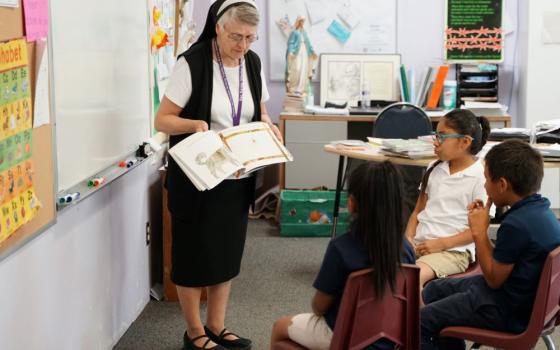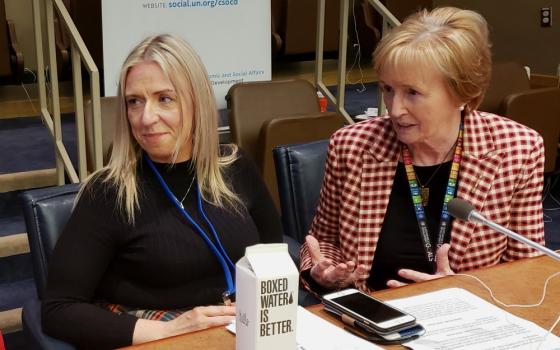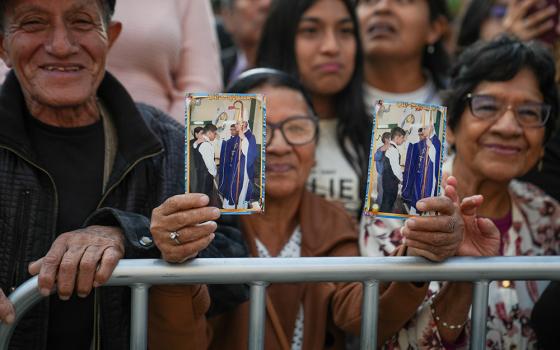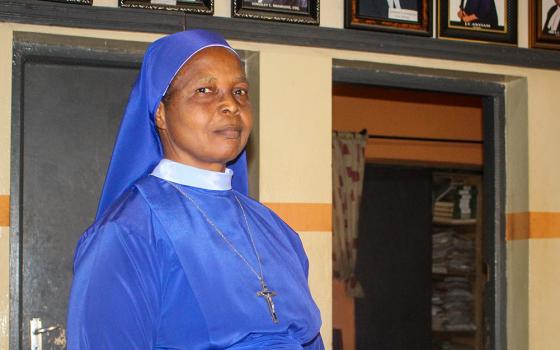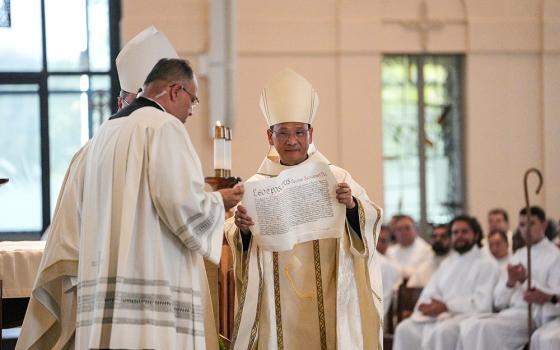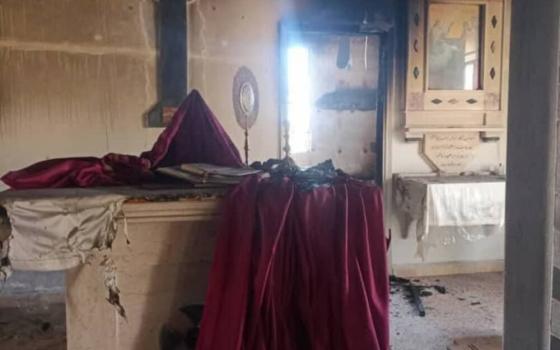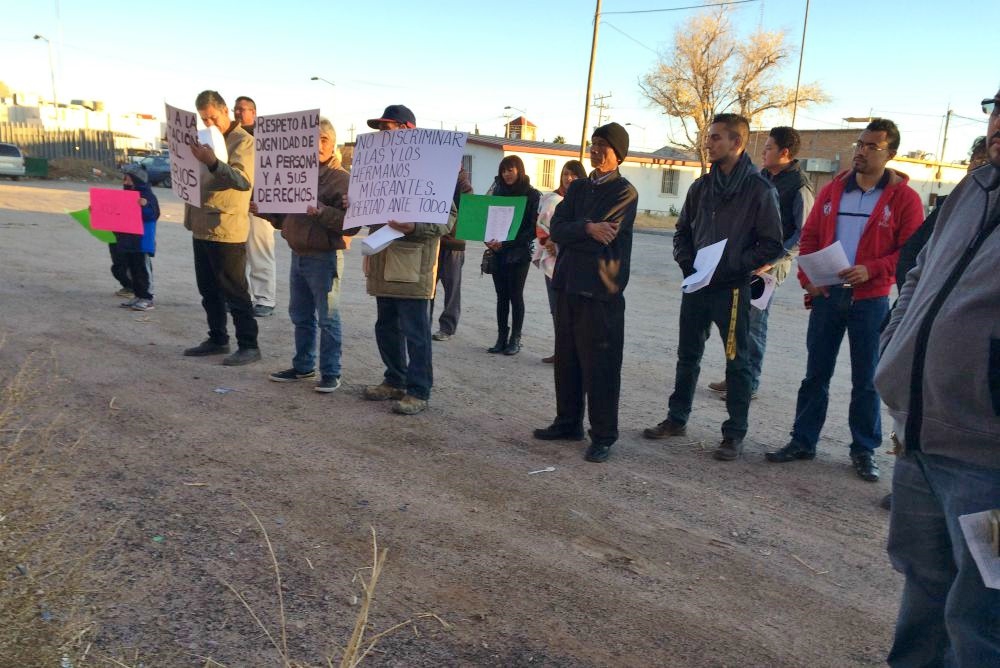
Protesters at the border wall between Douglas Arizona and Agua Prieta, Sonora, Mexico (School Sisters of Notre Dame)
This month, panelists reflected on ways they or their institutions work for reconciliation and understanding among disparate groups, such as on the U.S.-Mexico border, with transgender people, among different religions, in sponsored ministries or even in the parish choir. They responded to this question:
Describe ways your community, local church or country's government fosters dialogue between groups with differing values.
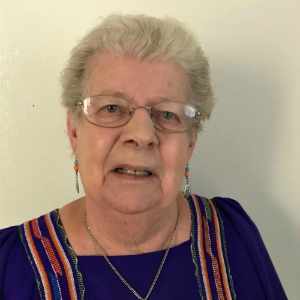 Marie Vianney Bilgrien is a School Sister of Notre Dame living in El Paso, Texas. She taught grade school in Wisconsin and Mississippi and served in Bolivia as a catechist and the director of an orphanage. She directed Hispanic ministry in an Oregon diocese and worked in higher education in Shreveport, Louisiana, and El Paso. After she received a Doctor of Sacred Theology degree from the Angelicum in Rome, she began work with the Graduate Theological Foundation and the University of Texas at El Paso.
Marie Vianney Bilgrien is a School Sister of Notre Dame living in El Paso, Texas. She taught grade school in Wisconsin and Mississippi and served in Bolivia as a catechist and the director of an orphanage. She directed Hispanic ministry in an Oregon diocese and worked in higher education in Shreveport, Louisiana, and El Paso. After she received a Doctor of Sacred Theology degree from the Angelicum in Rome, she began work with the Graduate Theological Foundation and the University of Texas at El Paso.
The School Sisters of Notre Dame have an international committee on peace and justice with regional committees working in different areas around the world, dealing with reconciliation, solidarity with the oppressed, promotion of human dignity, and collaboration with ecological movements to safeguard Earth.
Our congregational goals are: Shalom. Peace, justice and care of creation. Our main areas of concern are: immigration/migrants/refugees; human trafficking; peace and nonviolence; indigenous peoples.
We operate a nongovernmental organization with a sister representative who participates in U.N. meetings, such as the U.N. Commission on the Status of Women. Each year, some of our colleges send a few girls to experience how the U.N. works and do some advocacy.
I live and work in El Paso, Texas, which has become a hotbed and center of the U.S. refugee situation. Annunciation House has a 40-year history of helping refugees, so it has a good staff and trained volunteers.
El Paso has many such groups. The newest is the Hope Border Institute, an independent grassroots organization based on Catholic social teaching. We use research, reflection, leadership development, education and action in working for justice to transform the region around El Paso; Cuidad Juarez, Mexico; and Las Cruces, New Mexico.
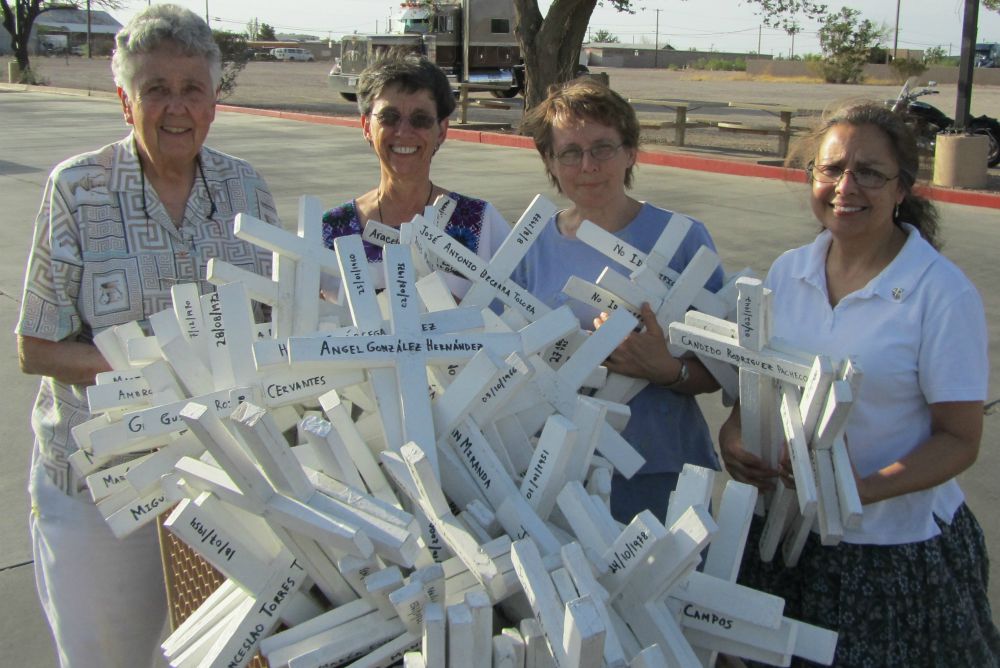
Srs. Mary Louise Behneke, Judy Bourg, Lucy Nigh and Christine Garcia, School Sisters of Notre Dame, with a shopping cart full of crosses to mark the people whose remains have been found in the desert, head to a "healing our border" vigil in Douglas, Arizona, in 2011. (Provided photo)
The dedicated people of this area have worked together for decades to fight injustice issues as they arise. It is discouraging that so many people in the United States have no idea even of where this area is and only think of it in terms of drugs and violence. El Paso averages 23 murders a year; for the last five years, it has been named the first or second safest big city in the United States. The people are solid citizens trying to help their suffering brothers and sisters.
On June 27, the bishop of El Paso, Mark Seitz, learned that a group of refugees who had legally crossed into the United States were being taken back across the border as a result of the "Remain in Mexico" program. He went down to the bridge, talked and prayed with the group, and walked with them across the border. He then spent hours discussing with the authorities and lawyers why the group should be allowed to stay in the U.S. After hours of discussion, he and the group returned to the U.S. But what will happen next?
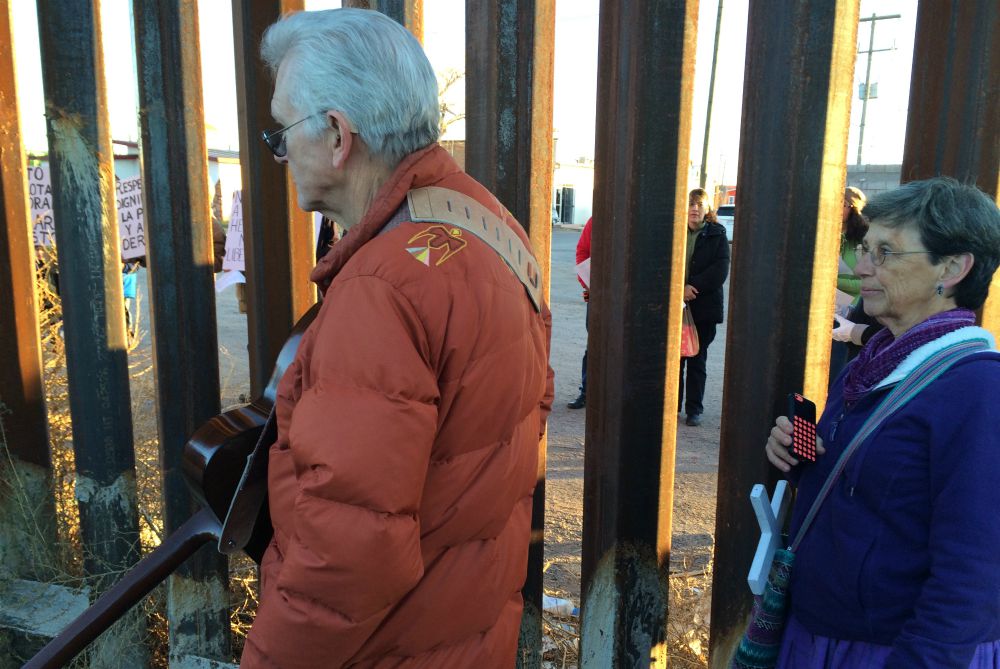
Jack Knox, a Mennonite pastor, and Sr. Judy Bourg, a School Sister of Notre Dame, stand against the border wall in 2018. (Provided photo)
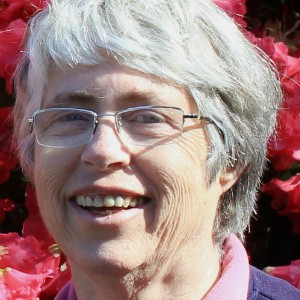 Sheila Campbell is a Medical Missionary of Mary sister of Irish and Brazilian nationality. After an early nursing ministry in Ireland, she did nursing, health education, parish work, and pastoral health care work (specializing in HIV/AIDS) as a missionary in Brazil. She later served in congregational administration in Ireland and in Brazil with families affected by urban violence and prostitution. Currently, she serves sick and elderly sisters at her congregation's home in Massachusetts.
Sheila Campbell is a Medical Missionary of Mary sister of Irish and Brazilian nationality. After an early nursing ministry in Ireland, she did nursing, health education, parish work, and pastoral health care work (specializing in HIV/AIDS) as a missionary in Brazil. She later served in congregational administration in Ireland and in Brazil with families affected by urban violence and prostitution. Currently, she serves sick and elderly sisters at her congregation's home in Massachusetts.
Sr. Sheila Devane is one of the more colorful members of the Medical Missionaries of Mary, our religious congregation. (Every congregation has them!) She can tell funny stories that make you cry with laughter, has the most flamboyant dress sense and is always first to promote issues that others want to be forgotten or pushed under the carpet.
I first met her in the late '60s, when we were novices. Already a nurse and midwife, after first profession, she worked for many years in Tanzania. It was there that her second passion developed: the need for mental and social health. Sheila returned to Europe and retrained as a clinical psychologist, then returned to Africa to do pioneering work in this field.
Now in her 70s, she works in higher education in Dublin. Recently, she was telling me about her work in student counseling services. Vibrant as ever, she does one-on-one counseling, supervises trainee clinical psychologists, and does some external advocacy. She told me about a group in special need of support. This is the transgender community.
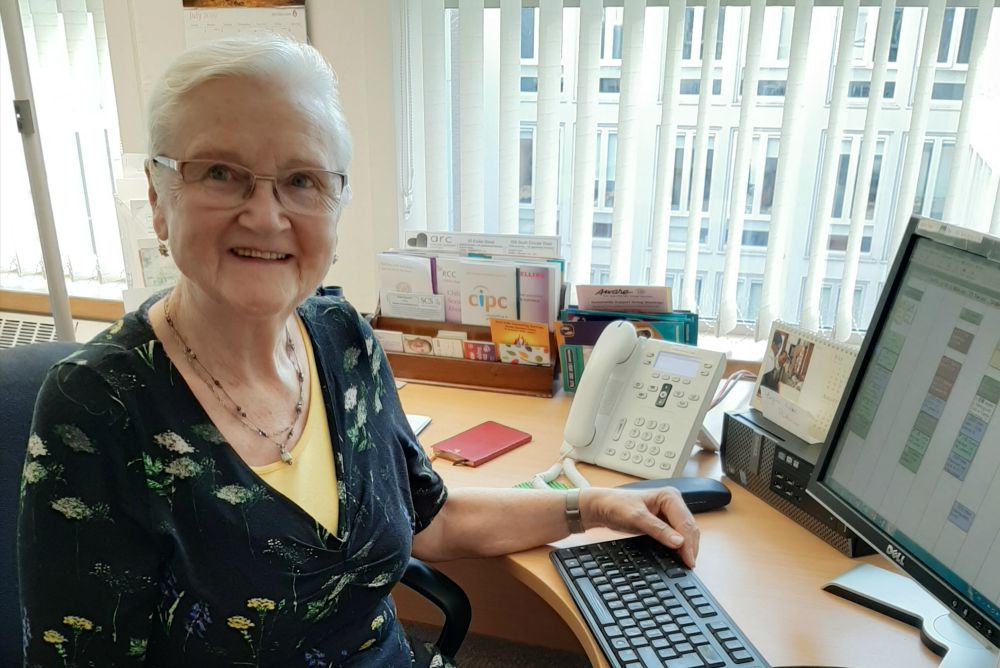
Sr. Sheila Devane, a Medical Missionary of Mary sister, in her counseling office (Sheila Campbell)
As Sheila says: "When I think of stigma, suffering, misunderstanding and downright abuse, I think of them. The ones I work with are often in late adolescence or young adulthood. They believe they are in the wrong bodies, struggle for years to come to terms with this hard personal and social reality; try to handle 'coming out,' to accept all the shame, negativity, ignorance and transphobia thrown their way, and still continue to transition across every domain in their lives: their names, pronouns, gender identity, dress code, school (often), documents, bodies and all that goes with this massive change legally, in their family, socially, educationally, biologically.
"They are definitely the most misunderstood, unaccepted, ridiculed, seriously abused people I have ever worked with, and regretfully, among the least helped and supported. They have no public traction. I feel genuinely blessed to work with and among them and to be able to be what we call in this trade 'one good adult' in their long Calvary."
Sheila's ministry challenges me to look at how I work with people who are "different," our modern-day lepers and outcasts.
The official church teaching is not yet very supportive of the trans community, but being with the most marginalized of society is following in the footsteps of Jesus himself. Helping others to understand and accept their reality is truly a Christian ministry.
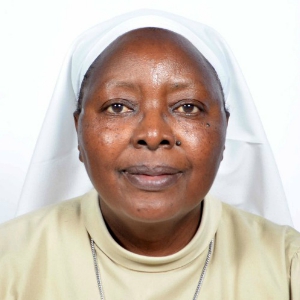 Bibiana M. Ngundo is a member of the Little Sisters of St. Francis in Kenya. After graduate studies, she was a visiting scholar at the Center for Applied Research in the Apostolate (CARA) in Washington, D.C., and is currently a lecturer in African culture and religion at the Catholic University of East Africa. Her current academic interests include collaboration between Catholic sisters and the Archdiocese of Nairobi, Kenya, and issues centering on indigenous women religious in Africa.
Bibiana M. Ngundo is a member of the Little Sisters of St. Francis in Kenya. After graduate studies, she was a visiting scholar at the Center for Applied Research in the Apostolate (CARA) in Washington, D.C., and is currently a lecturer in African culture and religion at the Catholic University of East Africa. Her current academic interests include collaboration between Catholic sisters and the Archdiocese of Nairobi, Kenya, and issues centering on indigenous women religious in Africa.
Since the beginning of creation, there has been conflict in the world. Some psychologists have opined that an innate human instinct for aggression is the root cause of conflict. We, the Little Sisters of St. Francis, endeavor to promote dialogue and peace in little ways every day. This was the spirit of St. Francis of Assisi.
The year 2015 was a real bump in my ministry with the St. Clare Parish choirs. In February, as we prepared for music festivals, a young man with great musical talent joined one of the choirs. In no time, he proved to be too far beyond our music knowledge and talent. However, his talent was met with stony faces by some choir members, particularly those who did not belong to his ethnic community.
Advertisement
At this time, Kenya was struggling to reconcile ethnic communities affected by post-election violence resulting from tribal differences. At first, we treated the emerging differences in the choir as a passing cloud, which was not to be. In no time, a negative wave swept through the choir, leading to diminished numbers, quarrels, indisputable differences and poor singing. I always thank God that this young man came so that what had been buried over the years could blow up for a fresh breath of life.
Here's what we did: In a discernment phase, we had several meetings with the group and individuals in an effort to understand the problem. We met with the chaplain and choir officials and had some separate meetings with officials. We discovered deep-seated hatred, tribalism, strife and competition, jealousy, and conflict of interest in the choir.
Then we took action. We organized prayer groups for the spiritual support of this group, invited experts in conflict management, organized consultative retreats, and provided psycho-spiritual counseling to individuals, committees and the entire group.
What were the outcomes?
After months of prayer and discernment, we dissolved the choir. We wrote a constitution with proper guidelines and conditions, adopted a new name and new dress code, and initiated fresh recruitment. The members were commissioned after one year under the new constitution, and reconciliation and peace have been achieved to this date.
By the time of that commissioning in 2016, it was clear to everyone that a choir is a spiritual movement and not a political party. A choir exists to fulfill a sacred role by participating in divine worship.
Like St. Paul (2 Corinthians 5:18-20), I believe God has called us to the ministry of reconciliation in the world.
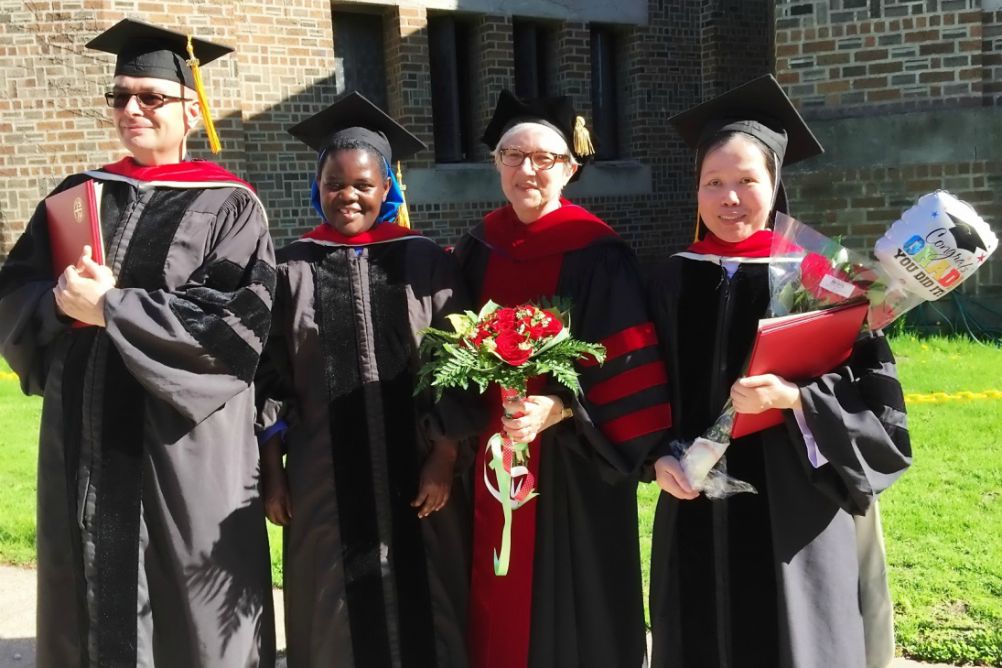
Darren Maslen, Congregation of the Blessed Sacrament from Ireland (D.Min.), Sr. Jane Frances Nabakaawa, Daughters of Mary from Uganda (D.Min), Franciscan Sr. Dawn Nothwehr (Ph.D.) and Dominican Sr. Ann Diep Nguyen from Vietnam (D.Min.) on their 2018 graduation day at Catholic Theological Union, Chicago, Illinois (Provided photo)
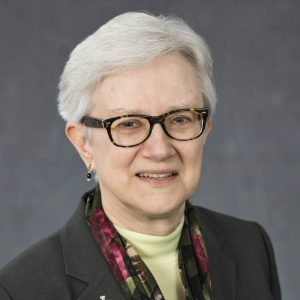 Dawn Nothwehr is a Franciscan Sister of Rochester, Minnesota. She has taught religious studies at several universities in the Midwest and since 1999 has held academic appointments at the Catholic Theological Union in Chicago, where she currently holds an endowed chair in Catholic theological ethics in the Department of Historical and Doctrinal Studies. She is a prolific writer and speaker, publishing in peer-reviewed journals, blogs, book reviews, online posts and media.
Dawn Nothwehr is a Franciscan Sister of Rochester, Minnesota. She has taught religious studies at several universities in the Midwest and since 1999 has held academic appointments at the Catholic Theological Union in Chicago, where she currently holds an endowed chair in Catholic theological ethics in the Department of Historical and Doctrinal Studies. She is a prolific writer and speaker, publishing in peer-reviewed journals, blogs, book reviews, online posts and media.
Franciscans represent God's wide variety of sisters, brothers, issues and ministries. Hence, Franciscans quickly become well practiced in dealing with valuing — even traditional Franciscan values — differently.
Fortunately, Franciscan Br. John Duns Scotus (1265-1308) developed the concept of haecceitas (individuation or "thisness"), which provides the philosophical foundation for everything in created reality being identified as specific entities and makes it possible to comprehend the profound sacredness of each distinct person. Without individuation and at least two distinct entities, no authentic interpersonal relationship is possible! Everything and everyone shares in being.
"Being-ness," found in all that exists, is Scotus' concept of the univocity (one voice) of being. Because of this, we can speak about God, recognize God's activity in ordinary life experiences, and communicate our understandings to others.
Scotus' principles demonstrate there is a truth to be known, and humans are capable of reasoning toward it — with the ultimate Truth known only in God. This implies that how we engage one another in our differences matters. Genuine dialogue, characterized by an authentic stance of profound humility and mutual regard for the imago Dei in each person, is required. An exemplary set of guidelines for genuine dialogue is Cardinal Joseph Bernardin's Principles of Dialogue of the Common Ground Initiative.
Today, similar practices of dialogue are found in the ministries of my community, who (as St. Francis recommended) bring the tools of our trade. Here are a few examples.
Inspired by the 1219 encounter of St. Francis with Sultan al-Malik al-Kāmil, we engage in interreligious dialogue, especially with our Muslim sisters and brothers. Sisters work to overcome the conflicts perceived between religion and science by upholding the founding values and vision Franciscans brought to the Mayo Clinic and its St. Marys campus. We have supported the Monks Community Forest project in Cambodia, doing reforestation and peace-making with poachers. We have worked for the repeal of the Vatican's Doctrine of Discovery in light of injustices against indigenous peoples.
I teach theological ethics courses concerning Catholic social teaching, power and racial justice, and just war theory at Catholic Theological Union, with students from over 40 countries and numerous religious orders. I also serve on the international board of the Parliament of the World's Religions and do consultation and advocacy on environmental justice issues. All are shaped by Bernadin's Common Ground Principles. When necessary, we use words!
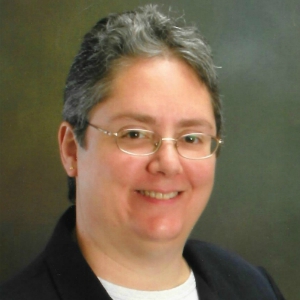 Patrice Colletti is a Salvatorian Sister (Sisters of the Divine Savior) in South Dakota who helps lead the Kateri Initiative, a pastoral ministry that focuses her apostolic religious community on authentic, culturally sensitive interactions. She works on the Sisseton-Wahpeton Sioux Tribe's reservation in South Dakota, serving as an educational leader in the tribal school system, teaching, mentoring teachers and supporting the tribal nation's efforts at self-determination and its claim to sovereignty.
Patrice Colletti is a Salvatorian Sister (Sisters of the Divine Savior) in South Dakota who helps lead the Kateri Initiative, a pastoral ministry that focuses her apostolic religious community on authentic, culturally sensitive interactions. She works on the Sisseton-Wahpeton Sioux Tribe's reservation in South Dakota, serving as an educational leader in the tribal school system, teaching, mentoring teachers and supporting the tribal nation's efforts at self-determination and its claim to sovereignty.
My grandmother, admonishing me for some childish conflict, said, "You don't have to agree. You do have to listen! There's no other way to solve the problem!"
That ability to open one's heart to another perspective is foundational for true dialogue that creates two-way understanding. The goal is solving a problem or resolving a disagreement. Deep listening is a countercultural stance, particularly in my country's highly polarized, highly contentious time. And in a world that faces ecological struggles that will significantly change and challenge humanity's journey within our lifetime, dialogue hints at a way forward.
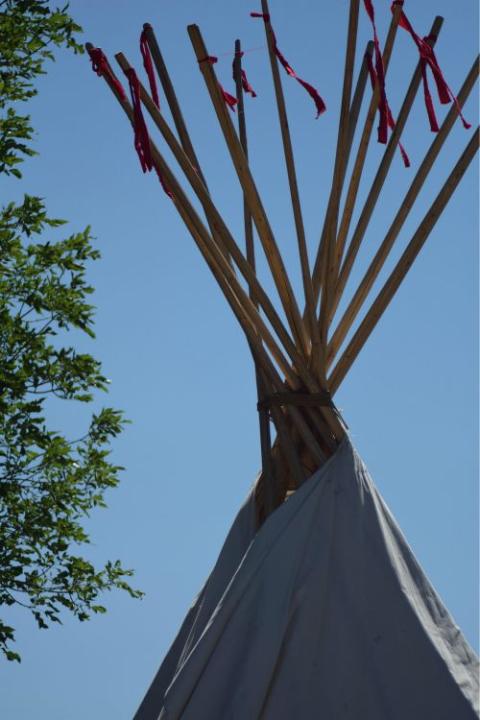
Tipi seen at Sissetowan-Wahpetowan Oyate wacipi or powwow, held each summer for about 149 years (Patrice Coletti)
My Salvatorian community is a global community of over 3,000 members in nearly 50 countries and crossing hundreds of cultural, political, tribal, philosophical, gender, socioeconomic and language boundaries every single day. As Sisters of the Divine Savior, lay Salvatorians, and priests and brothers of the Divine Savior, we continually respond to our founder's vision of inclusion and collaboration even beyond our community relationships. Dialogue, including listening with mind and heart, is part of our being, though not automatic or easy.
We don't let its difficulty stop us, though. In our sponsored ministries — in hospitals, schools, and dispensaries; as educators, attorneys, professors, CEOs, marketing professionals, or parents — we choose listening and dialogue. It is an intentional choice. Our formation process teaches us how to do it. Our community life necessitates it. Our presence and involvement in the neighborhoods, villages and cities where we live and work witness to it.
Since 2014, I have been part of our Salvatorian pastoral initiative called the Kateri Initiative, providing our Salvatorian members in the U.S. with pastoral training and experiences that increase our cross-cultural competence. Whether we live where I do — in a small rural town on an Indian reservation in South Dakota — or elsewhere in our country, we see our neighbors facing the challenges of racism, poverty, suicide, drugs and violence. While we cannot fix these difficulties merely with our presence and skills, we can witness to the effect of listening and dialogue. We listen and learn from our neighbors even in the midst of their daily life struggles. We listen with open hearts and minds; doing so transforms us even as it helps local people create solutions for the challenges they face.
Their issues are a far cry from the petty squabbles of my childhood. Yet my grandmother's words still ring true — good advice for our weary, hurting world.
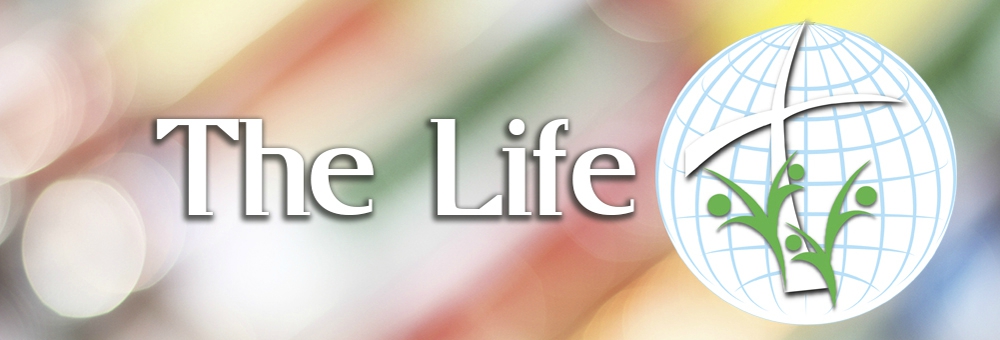
Click here to read more about the panelists for The Life, GSR's monthly feature about the unique, challenging and very specific lives of women religious around the world.

